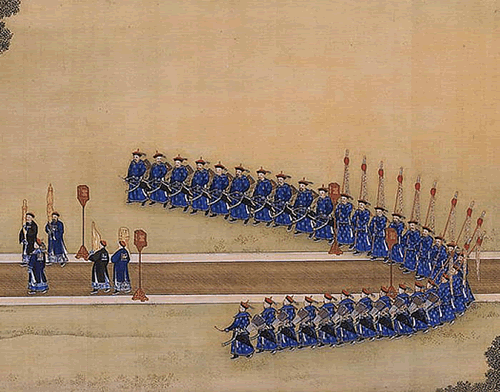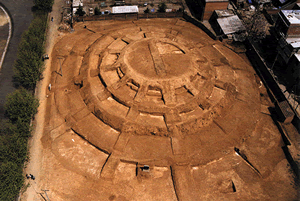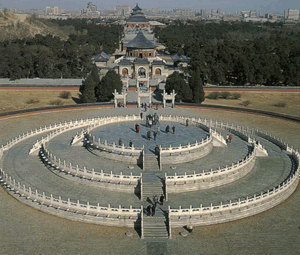The Emperor in the Cosmic Order
THE OFFICIAL RITES AND DUTIES OF THE EMPEROR
The State Cult gave powerful ritual emphasis to key elements of state ideology and to the basic political organization of the state. Participants in the official rites were the emperor, his bureaucracy, and other degree-holders. There was no independent priesthood, for worship — guided by bureaucrats according to government regulations — was considered an official duty.
The prayers and rituals that accompanied the many duties of the emperor were not designed by any one emperor. Rather, classic ritual texts were debated and revised under every dynasty. It was incumbent upon a sitting emperor to perform these rituals in order to demonstrate that he was the rightful emperor — to validate his own position within the system, and at the same time, to validate the system itself. The emperor needed to express his commitment to the ideas that were behind these rituals, and so it was that every Chinese emperor worshipped Heaven and Earth at the Temple of Heaven and also at the sacred Mount Tai.
THE EMPEROR AT THE TEMPLE OF HEAVEN: WORSHIPPING HEAVEN, EARTH, AND THE ANCESTORS*
One of the emperor’s annual religious responsibilities was the ceremony at the Temple of Heaven. When the emperor, as the Son of Heaven (Tianzi), with the Mandate of Heaven (Tianming) to rule over human society, worshipped at the Temple of Heaven, he was worshipping Heaven and Earth as his symbolic parents and in expression of the anciently established Chinese state ideology which held that the emperor was not divine but divinely appointed.
The emperor’s duty was to insure that society expressed its natural order, which was but an aspect of the cosmic order of humanity (society), heaven, and earth. The emperor also worshipped his own ancestors, expressing the Confucian ethic of filial loyalty, which was an obligation that all Chinese, regardless of social position, had to honor. Other objects of imperial worship were the sun, the moon, Confucius, the emperors of earlier dynasties, the god of agriculture (in a ritual which included the symbolic plowing by the emperor of the first furrow of the new farming season), and other divinities representing important natural or social forces (such as the god of learning).
THE THREE PROSTRATIONS AND THE NINE KOWTOWS: FROM THE IMPERIAL COURT DOWN TO THE VILLAGE
When the emperor worshipped at the Temple of Heaven, he worshipped through a ritual called the “three prostrations and nine kowtows.” The emperor would be commanded by a high-ranking bureaucrat to prostrate himself, which he would do. He would then be told to kowtow once, then to kowtow a second time, then a third time. Each time he did so, he would touch his head to the ground. (The word “kowtow” is an Anglicized rendering of the Chinese word ketou, meaning “to knock the head” against the ground.) The emperor would then be told to arise, then to prostrate himself again and begin another cycle of this sequence, which would have to be repeated a total of three times — three successive prostrations, each with three kowtows, for a total of nine kowtows.
This ritual of the Three Prostrations and the Nine Kowtows was an important one, for it was also what an ordinary farmer would perform at the funeral of his father. Indeed, the phrase “from the imperial court down to our village” was commonly found in widely circulated documents during those days. People used this phrase again and again to express the interconnection and commonality amongst all Chinese people, regardless of social position.
THE IMPORTANCE OF AN ENDURING BUREAUCRACY
The fact that high government officials were commanding the emperor himself to kowtow during the ritual of the Three Prostrations demonstrates how these two key institutions — the imperial and the bureaucratic — were intertwined and in fact, interdependent. Consider that by the time of the Qing dynasty the governmental bureaucracy in China had already been around for hundreds of years. The ceremonies that the new Qing emperors were taking up were not invented by the Qing, or even the Ming who preceded them. These rituals were ancient, and the continuity of these rituals and the traditions they expressed were in the hands of an enduring bureaucracy.

The Yongzheng Emperor Offering Sacrifices at the Altar of the God of Agriculture (detail), 1723-35
Anonymous court artists, Qing dynasty
Handscroll; ink and color on silk
61.8 x 467.8 cm
© The Palace Museum, Beijing
IMPERIAL LEGITIMACY AND THE COSMIC ORDER:
THE MANCHU QING AND THE “MANDATE OF HEAVEN”
In the Chinese tradition, the emperor did not necessarily have the absolute power that is associated with the traditional monarchies of Europe. The emperor’s actions had to be tempered by basic political expectations, and he had to act properly as an integral part of the cosmic order. The expectation was that an emperor should be an exceptional being — a sage king — and his right to rule was contingent upon his ability to skillfully mediate the cosmic forces. As mediator between Heaven and Earth, the emperor was thought to be a major participant in all cosmic actions, and as such he had to conduct himself accordingly, or the repercussions, in terms of cosmic dislocation, could be very serious. If things went wrong — a bad crop year, for instance — the emperor could be held responsible. He could be overthrown, and this would be considered legitimate. When such an overthrow occurred, it would be understood that the emperor had “lost” the Mandate of Heaven. In this way the notion of imperial legitimacy was fundamentally linked to the notion of maintaining the cosmic order.
When the conquering Manchus overthrew the reigning Ming dynasty and established the Qing dynasty in 1644, they announced that the Ming had lost the Mandate of Heaven. However they also continued to worship the Ming emperors throughout the 268-year duration of the Qing dynasty. Why did the Manchu Qing rulers do this? Because the Mandate of Heaven was centered on the principle of legitimacy — meaning that the Ming (and others before the Ming) had legitimately held the Mandate at one point in time, but no longer. The Qing buttressed their own claim to the Mandate by acknowledging the Ming’s legitimate claim to it in the past. In continuing to worship the Ming emperors as they did, the Qing were asserting the legitimacy of the entire system that dictated who could “rightfully” be an emperor of China, because in fact it was this system that allowed them to present themselves to the populace as “Sons of Heaven” rather than as conquering foreigners who had no legitimate claim over China.
In other domains, however, the Qing decided to maintain their Manchu ethnicity, and even linked their own political power to this separation. This contradiction — of acting as “Chinese” emperors at the same time that they were maintaining their separate Manchu identity — was something that the Qing never successfully resolved. And it could be argued that, in the end, this was a mistake that cost the Manchus their dynasty, for anti-Manchu sentiment was at its height toward the end of the Qing and certainly contributed to the dynasty’s collapse in 1911.

